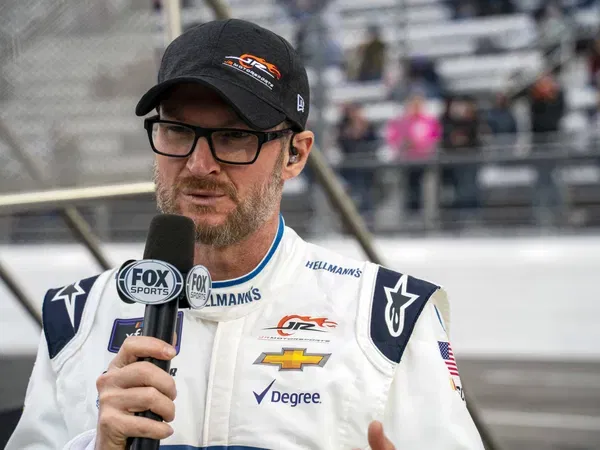

Dover Motor Speedway has always been a track that tests the limits of drivers and fans alike. After the latest race, the heat wasn’t only in the air, it simmered online as well. When Dale Earnhardt Jr. posted on X reflecting on the event, what seemed like a straightforward comment quickly ignited a fierce debate among NASCAR enthusiasts. The reaction was near immediate and intense, a flood of voices expressing frustration and disappointment.
Watch What’s Trending Now!
The Next-Gen car has long been a point of discussion among NASCAR fans. And on this scorching yet rain-soaked afternoon in Dover, that chatter took on a new life form after Dale Earnhardt Jr.’s post on X. From aero blocking to a lack of passing, fans had a lot to say about the EchoPark Automotive 400 at Dover Motor Speedway.
Dover’s drama and Dale Earnhardt Jr.’s online storm
Dover is well known for its physically demanding concrete surface and focus on race strategy, requiring drivers to balance aggression and patience under tough conditions. As the latest Cup race unfolded under overwhelming heat, the event drew a mix of anticipation and skepticism from fans and drivers alike. NASCAR’s decision to push forward with the race despite challenging circumstances was a topic of discussion before the checkered flag.
But the race was flagged off on time, and despite a 56-minute rain delay, we got a winner under green, unlike the Xfinity race, where Connor Zilisch won a shortened race. Taking all this in, Dale Earnhardt Jr. reflected on the weekend via social media, posting on X, “Dover was interesting for sure. Great run to the finish. Glad NASCAR gave it the best effort to see the checkered. Indy next.” His tone suggested appreciation for NASCAR’s commitment to completing the event, acknowledging the difficulties faced by drivers and officials alike. But was the race as entertaining as Jr. paints it?
Dover was interesting for sure. Great run to the finish. Glad Nascar gave it the best effort to see the checkered. Indy next.
— Dale Earnhardt Jr. (@DaleJr) July 20, 2025
With just 13 lead changes across the 400-mile race and passing being harder than ever, Dover felt like a defensive slugfest more than a passing paradise. The new tire compound introduced for this race seemed to benefit the highly skilled drivers, as the Hendrick Motorsports and Joe Gibbs Racing teams adapted quickly and held track position for long periods of time. Chase Elliott had a stretch of 170 laps in the lead, while Christopher Bell led for nearly 50 laps at a stretch.
The race culminated in a slew of restarts, leading to overtime, and the field couldn’t seem to keep it together before the white flag, adding another black mark to the race that was built on long green flag runs but finished on multiple restarts. As the race closed, the conversation turned toward how NASCAR’s current approach would resonate with fans tired of predictable finishes. Earnhardt Jr.’s post, though measured in its positivity, set the stage for a wave of reactions that revealed the complex and sometimes tense relationship between the sport’s leadership and its loyal audience.
Fans call for change
The response to Dale Earnhardt Jr.’s positive take on NASCAR’s Dover tactics was swift, sharp, and overwhelmingly negative. Fans didn’t mince words, using social media as their grandstand to voice everything from nostalgia to outright disgust. “I think it’s time to put the ‘stock’ back in stock car racing,” one fan commented, echoing a common call for a return to racing’s roots as frustration with modern car design grows.
Another added, “It sucked. The damn aero blocked GT car sucks. We have to quit excusing this,” targeting not just the racing action or lack of it, but also what’s seen as a design philosophy problem. The car’s aerodynamics make passing incredibly difficult, as you can give dirty air to the driver attempting a pass, completely disrupting their momentum. “I disagree. It was painful to watch. Parades are for Indy cars,” wrote a longtime viewer, suggesting that NASCAR’s identity itself feels under threat.
The misery didn’t stop with the on-track action. “Miserable weekend, I can’t even imagine being there in the heat. Probably worst oval in the schedule, and watching the classic races, this has always kind of been the case. Place has never not been all about track position,” said one fan, blending personal impression with a critique of the venue and its history.
Dover is a track where champions normally feast, with Jimmie Johnson owning 11 wins at the track and Kyle Busch owning three, so it was no surprise to see another former winner in Denny Hamlin claim his third, and fans could see it coming once the #11 took a late lead, as passing him even on restarts proved very challenging. “Come on. The car and that race was terrible,” a user summed up what seemed like the prevailing sentiment.
Among fans, memories of more unpredictable, hard-fought finishes haven’t faded, and Dover’s race, in their view, was anything but. The sheer volume and tone of criticism directed at Dale Jr. demonstrate two things. First, even the most respected figures in the sport are not immune to social media’s fire. Second, NASCAR’s audience remains deeply invested, willing, even eager, to challenge both the sport and its public faces when they feel let down.
What unfolded underneath Dale Jr.’s seemingly innocuous tweet was another chapter in the ongoing, sometimes bitter, conversation NASCAR fans have with their sport: loyal, passionate, and always demanding better. What did you think of the race at Dover? Let us know in the comments!








